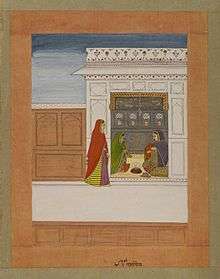Pausha
Pausha (Sanskrit: पौष Pauṣa; Hindi: पूस Pus; Tamil: தை Tai) is a month of the Hindu calendar and as well in the Indian national calendar; it's the tenth month of the year, corresponding with December/January in the Gregorian calendar.[1]

In lunar Hindu calendars, Pausha (also called Paush or Poush maas) begins with either the full or new moon in December and is the ninth month of the year. Since it follows the lunar cycle, its start and end varies year by year unlike the solar cycle Hindu calendars. Pausha is a winter (Shishir Ritu) month.[2][3] The Hindu lunar month Pausha overlaps with its solar month Dhanu in the Hindu lunisolar calendars.[4][5]
Events
Pausa Bahula Amavasya day is celebrated Theppotsavam (Float festival) at Sri Varaha Lakshmi Narasimha Swamyvari Temple in Simhachalam. The ‘Utsava idols’ are taken in a palanquin to ‘Varaha Pushkarini’.[6]
| Shukla Paksha | Krishna Paksha |
|---|---|
| 1. Prathama | 1. Prathama |
| 2. Dwitiya | 2. Dwitiya |
| 3. Tritiya | 3. Tritiya |
| 4. Chaturthi | 4. Chaturthi |
| 5. Panchami | 5. Panchami |
| 6. Shashti | 6. Shashti |
| 7. Saptami | 7. Saptami |
| 8. Ashtami | 8. Ashtami |
| 9. Navami | 9. Navami |
| 10.Dashami | 10.Dashami |
| 11.Ekadashi | 11.Ekadashi |
| 12.Dwadashi | 12.Dwadashi |
| 13.Thrayodashi | 13.Thrayodashi |
| 14.Chaturdashi | 14.Chaturdashi |
| 15.Purnima | 15. Amavasya |
inform start and End of Amavasya
See also
- Hindu units of measurement
- Hindu astrology
- Indian astronomy
References
- Henderson, Helene. (Ed.) (2005) Holidays, festivals, and celebrations of the world dictionary Third edition. Electronic edition. Detroit: Omnigraphics, p. xxix. ISBN 0-7808-0982-3
- James G. Lochtefeld (2002). The Illustrated Encyclopedia of Hinduism: A-M, N-Z (Vol 1 & 2). The Rosen Publishing Group. pp. 508. ISBN 978-0-8239-3179-8.
- Robert Sewell; Śaṅkara Bālakr̥shṇa Dīkshita (1896). The Indian Calendar. S. Sonnenschein & Company. pp. 5–11, 23–29.
- Christopher John Fuller (2004). The Camphor Flame: Popular Hinduism and Society in India. Princeton University Press. pp. 291–293. ISBN 978-0-69112-04-85.
- Robert Sewell; Śaṅkara Bālakr̥shṇa Dīkshita (1896). The Indian Calendar. S. Sonnenschein & Company. pp. 10–11.
- Teppotsavam. "Festivals". Simhachalam Devasthanam. Retrieved 24 June 2016.